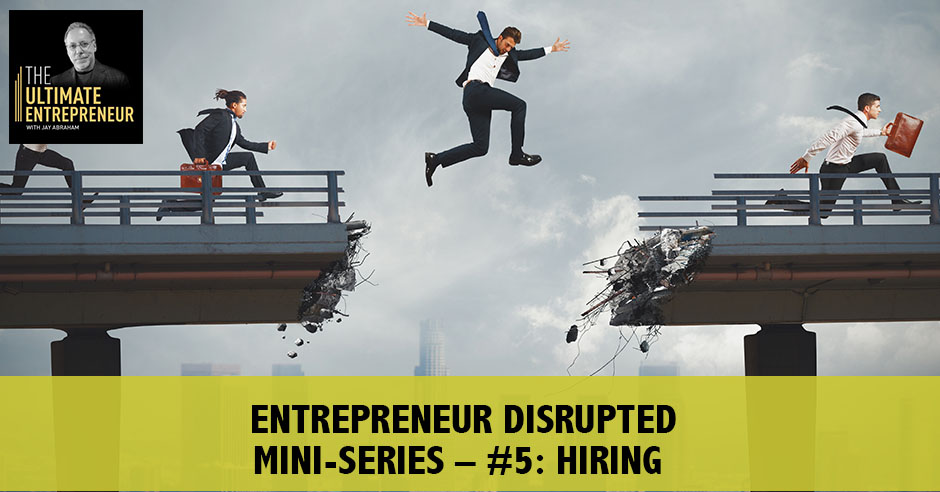Entrepreneur Disrupted Mini-Series – #5: Hiring


Hiring the optimal team can be a catalyst for your wild business success. In #5 of Entrepreneur Disrupted,discover when it’s time to bring someone new on board with expert advice from top business executive marketing coach Jay Abraham. In Jay’s diverse (and fascinating) 30 year career, working in hundreds of separate industries, he has been credited with over $9 Billion Dollars of business growth, for companies large and small across the globe. Jay reveals his insights on how to know when exactly to bring someone new on board, along with determining exactly who and why to hire and how to do it right. Learn how to properly communicate your vision to your team, the value of finding masterful mentors, hiring A players as opposed to B or C players, and how that can actually save you money in the long run.
This is absolutely one of the most powerful episodes so far. We have put an extraordinary amount of commitment and real world empirical front lines of capitalism knowledge to get this guidance, advice, and information out to you. Don’t just use it for entertainment. Make it a guidepost and a lighthouse for how you direct and execute your successful growth.
Listen to the podcast here:
Entrepreneur Disrupted Mini-Series – #5: Hiring
In our last episode, we briefly touched on the concept of hiring your disruptive team and all the nuances that go into that process. This is the day we go full force and leave no stones unturned, no doors unchecked, on what it really means to hire the optimal team that is going to be the catalyst for your wild and sustaining business success. We cover how an entrepreneur knows that it’s time to bring someone new on board, along with determining exactly who and why to hire and how to do it right. We cover how to properly communicate your vision to your team, the value of finding masterful mentors, hiring A players as opposed to B or C players, and how that can actually save you money in the long run.
This is absolutely one of the most powerful episodes so far. I truly hope you derive so much value from it that you make it a regularly and a constantly referred to template that guides your growth. Dave and I have put an extraordinary amount of commitment and real world empirical front lines of capitalism knowledge to get this guidance, advice, and information out to you. I hope you enjoy it. Don’t just use it for entertainment. Act on it. Reflect on it. Think about it. Make it a guidepost and a lighthouse for how you direct and execute your successful growth.
I’m a serial entrepreneur, the guy behind Bulletproof Coffee, but you might have already known that because it seems to be getting well known these days. Thank you if you’re drinking it right now. Jay Abraham here is one of the top business executive marketing coaches out there with thousands of clients up to hundred thousand dollars a day. He’s onstage with Tony Robbins regularly. I am fortunate that I get to pick his brain on this show which is really fun and valuable for me because it teaches me some things. I believe that the twenty years I’ve got doing this is going to teach you something. Basically, you’ve got a lot more experience than me. The reason I’m talking about experience right now is that this episode is all about when to hire and who to hire. Let’s talk about how an entrepreneur knows that it’s time to hire someone and then how they go through that decision process. How do you do it?
It depends on the structure of the business. It depends on whether you’re sales driven, whether you’re service driven, what to hire, when to hire, and also your capital base. It’s a very interesting dynamic that is predicated not on just a general question, but on needing to know answers to certain questions before you can address that macro question. If you are a company that basically has very little capital but you’ve got a great product or service and you can get a sales force right away, it may be worth temporarily using outsourced people to fulfill on the others. If you’re a company that has to produce a monumentally sublime and complicated and expensive service, then you’ve got to build the service out first before you can sell it or you’re just going to accelerate your rumination. I look at it a lot more dynamic than most people.
I tend to hire people as senior as I can find, really experienced, and that oftentimes means that I don’t have a way to pay them, especially in the very early days of Bulletproof. Bulletproof has been bootstrapped the entire time and people think I was talking about making $6 million when I was 26 and they think I’ve lived a life of luxury. They don’t hear that I lost my money when I was 28, so I was a multimillionaire briefly, which is actually really traumatic and painful. I’ve been living paychecks, kids, mortgages, car payments like everyone else, and I’m sitting here going, here’s a chance to hire someone. The first employee from Starbucks who opened their first four regions, that’s a good hire for someone who wants to do Bulletproof Coffee shops. I ended up doing a deal as a consultant, which is really helpful and this might be something you do. This was a pretty darn expensive consultant as you might imagine, but it meant I could turn off the spigot if we just didn’t have revenues to support it. After a few months when it became clear that there was a fit, we made it an employment situation.
The cool thing is if you have equity or profit sharing is part of your comp plan, you can oftentimes work with a senior person like that because they recognize there’s a big upside and you don’t have to have just wads of cash. It’s really tough though. If you haven’t built sales volume or you don’t have funding, you’re not going to go out and hire someone who’s a quarter million or $300,000 a year. Sometimes if you want someone with 25 years of big experience, you hire them for their network, you hire them for their relationships and for their ability to dodge bullets that you don’t see because you don’t know the industry that well.

Entrepreneur Disrupted: If you want someone with 25 years of big experience, you hire them for their network, their relationships and their ability to dodge bullets that you don’t see.
If you get someone like that, they’re going to pay for themselves and if not, you do what we talked about in the previous episode, which is you fire them and say good things about them, too, because they’re probably really good people. They just didn’t deliver the value that you thought they’d deliver. Whichever way that goes, let’s assume you hire someone who was really good, my take on this is I’m going to hire them when it’s a little bit uncomfortable. I’m going to try to make it consulting and that’s also because these are key players. If you get a chance to work with someone for 90 days or however long it is, they get to see whether I’m legit and I get to see whether they’re legit. When you’re dealing with A-players who’ve built a resume, one of the things that I was taught to do very early on was to work for marquee names when you’re building a reputation. Do you want to hire the guy who worked for Coca Cola or do you want to hire the guy who basically worked for some small insurance company? A guy who has a big name gets a glow, and I’m using guy generically here. It doesn’t really matter whether you’re a guy or girl. It’s a gender neutral pronoun.
When you’re dealing with that thing, the same thing happens on the flipside. If you’re going hire an A player, they’re concerned, you’re a startup, you don’t have a big brand yet. I don’t want a short stint as an employee at a no brand on my LinkedIn profile because it’s bad for me. I want big names or I want a big title at a smaller company. They want to know it’s going to work. Consulting is fine for them. You lower their risk by consulting. You may be able to use stock options as part of the consulting deal, but I find that they’re doing that as soon as you can possibly do best, as soon as you meet the right people. That’s one of the things that’s propelled Bulletproof’s growth, and so we have done in all the other jobs. If you look at guys like Uber, they’re going out because they’ve got the money right now and the brand. They’ll hire people away from Facebook, they’ll hire people from Groupon, they’re top tier people, and they’ll do it. It doesn’t seem to matter how much money it takes. I’m fortunate to know Travis before he got to be where he is at Uber, and he’s always had that mindset that you hire big, and you learn that from Silicon Valley. That doesn’t address the timing as much as the who, and the timing is for me before you’re that comfortable with it because you share risk with the person usually in the form of equity. Where are you on all this?
Every element of life really comes down to marketing strategy and selling. If you’re trying to sell someone on investing their future, their career, their financial or psychic wealth in your vision, the more you can describe, qualify, and demonstrate that the plan made sense and you could show that it’s very well thought out and not just this big abstract vision, an A player will get that. You show in the interview or in the series of conversations or dinners that you’ve thought through very methodically the forks in the road and the contingency areas so that you are prepared to take this to the fulfillment of the vision, whether it’s dynamically, constantly shift or whether it’s pivot. That’s one thing.
I’ve done a lot of things for clients where we’ve found people that either took sabbaticals because they burnt out from a business, or they were an executive assistant but they had children or got married and traveled and now they want to do things and they’re worth a lot more and we will retain them on very unique different variations. One is if they don’t terribly need the money, but they need the deserved compensation for who and what they are, we will accrue it subject to certain things happening or we will have milestones or benchmarks where it automatically grows. We will give a phantom equity. If it’s something that can be a subsidiary, we’ve even given them a residual participation in that as long as we always have the right to take it back. There’s a lot of cool things you can do with ingenuity, but none of that is doable if you don’t sell them on not just how righteous you are as a visionary, evangelical, or ethical person, but how viable your thinking is in terms of manifesting this vision.
If you’re thinking about your business is solid, you’ve got a good vision, you ought to be able to sell an employee on the company. There are some times though where you’re just not going to. A situation I ran into, a savvy top level employee is going to look at your cash position, how much money do you have, and “I really like the team or like what’s going on here, but I’m not convinced that you have enough money to achieve your mission and all that, and normally I would take a risk, but I have two young kids and a mortgage,” and this happens. The weird thing is there are different phases in life and I’ve seen this repeatedly, especially in Silicon Valley. There’s a way to take advantage of a weird age discrimination problem there. In Silicon Valley when you hit about 45, you know all the people in all the companies because all the friends that you met twenty years ago have percolated around. You can call people at senior levels all over the place, you have influence, you have a network, you have a reputation, and you’re expensive and then the company’s logo, I can probably hire someone for half as much, maybe even a third as much who doesn’t have that much experience and they’ll do reasonably well. It gets increasingly difficult to find work after 45 in Silicon Valley, and after 50, it’s like people don’t even look at you. I’m saying this, I’m 43, and I’ve watched it happen there, and people say, “We need to get a gray hair in here.” It’s a young and still mostly white culture. I’ve seen some shifts there for the positive, but that thinking does happen in other industries as well.
From my perspective, I want people with ten years more experience than me, but I love hiring people who have gotten to the point in their career where they’re willing to have some equity as part of their gig because they’ve already had enough success in their career that they have a little bit of flexibility there. Oftentimes at that point in life, they have families, but they aren’t like, “I have to feed my baby,” because there’s a time when you have young kids and, no, you’re the breadwinner and you will not go to the startup that doesn’t have enough cash. You just don’t have the ability to go three to six months finding another job and you don’t want to be forced into finding a job you hate so you can pay for your kids. I’ve made that same decision myself. You should consider people at all stages of life. As an entrepreneur looking to build a senior team, there’s amazing talent in the 50+ age group where you get 25 years of experience and you’ve got to hire for culture and you don’t want someone who’s rigid and inflexible. There’s a stereotype that people are going to get that way when they’re older and there’s probably some truth to that, but it’s certainly not the case for everyone. When you find people with way more experience than you, I would say you’re stupid not to hire them.
Everybody, even when they’re starting, should have a board of advisors, not directors, and really grasp the magnitude of mentors. You talked about gray hairs and I guess you would call me a gray hair, but I was one day looking up some of the statistics of people and mentors, and there’s documentation that people who had mentors of the right kind, their success was 300% higher and faster if they’re going to go public, all these things. Some of the most fascinating mentors in the world are older and have this bastion of knowledge that nobody recognizes to tap. Something like 120 Nobel prize winners were either 67 all the way to 85. The average board of director at major companies is about 65. There’s a list that I’ve got that’s got 500 famous iconic people, everyone from religious, political, sports, arts, entrepreneurship, and it shows the mentors they’ve had that were of a more mature level. That’s a great vehicle when you don’t have the knowledge or the capital.
I’m going to go back to the very early days of Silicon Valley. As a young egotistical guy, I was literally the first ecommerce ever, this is that t-shirt. I didn’t realize the impact of that at the time. I was working about 80 miles away from Silicon Valley, in the Central Valley. I used to live in Manteca, California. It’s where Highway 120 and I-5 cross, and it’s a farming community. They used to call it Manstinker because of all the dairies there. However, it is within commuting distance of Silicon Valley. I was working, actually doing filing at that time at an auto parts warehouse plant. I remember very well sitting there and I got the hairs on the back of my neck stood up and I was “Now that I know I can sell things on the internet, what if I sold books? Wouldn’t this be the coolest idea ever?” That was the ideal product for selling online and student bookstores are crappy. Amazon had not founded at the time. I just remember feeling like “This is the best idea ever,” and what did I do with it? I kept filing for $7.25 an hour, I have no idea how much I made, and I did that because I was safe and calm and I needed to pay for my school. At the same time, Marc Andreessen wrote the first web browser and is now a well known investor. In fact, I wrote a review of his browser versus his university browser for one of the big tech magazines because I was already freelancing during that time, so I’m in the mix, except I wasn’t wise enough to get a mentor.
What Marc did when he was a programmer at the NCSA, the National Center for Supercomputing in Illinois, he hooked up with Jim Clark who was already a successful technology veteran. You look at the amazing moves that Marc has done with his companies. Jim, especially in the early days, completely helped position that, the founding of Netscape. If you’ve been around for awhile, Netscape was THE browser years before Firefox and Safari and all that. I even had a chance to potentially acquire Marc’s company that ended up becoming OpSource when they were on their way up and on their way down. When I was at Exodus, we were competing. In fact, my product was competing with their stuff, but one of the differences is that Marc had the wisdom to go out and get a mentor early on and I was absolutely too stubborn and arrogant to ever consider such thing. I was also unaware of why people do mentoring. My perspective on life at the time was that no one would want to help and that’s not what people do. I truly did not understand the human nature was around helping other people, so I was like, “I just have to do this myself,” and I was completely wrong. It turns out that people with lots of experience actually get personal satisfaction from helping. I also think that if you hire someone with lots of experience who gets personal satisfaction from helping, not just as a mentor, but as an employee, there’s that helping spirit. When you have more power and more influence, helping provides more pleasure and more personal satisfaction.

Entrepreneur Disrupted: People with lots of experience actually get personal satisfaction from helping.
The only reason I possess the knowledge I have is that I had been blessed. When I was young, I was fascinating enough that 40 different people around the world took me under their wing and counseled me. When I was older, all kinds of very iconic people came to me, but then contributed to me. I want to make a very lateral point, that there’re two fallacies. One is that they don’t really want to give. I have all these people that you know that I stand ready to help with things that I honestly, without being arrogant, have done more of, in more ways with more success than anything and can give them an insightful two-minute answer, and they never availed themselves of it, which actually tears my heart out. I mean we all have ego, we want acknowledgement. We want to help people we admire who are doing valuable, admirable breakthrough things do more of it for more people, so more people’s lives will be enhanced, protected, and enriched. What I want to say is totally tangential. There’s a fallacy in the mind of most people when they see any kind of marketing with testimonials. They think that the testimonial is being given by the provider for the company. If you understand it, the provider has had his or her life or their health or their worldview or physicality or whatever it is, or their career, shifted so profoundly and so unimaginably that they want so badly from a humanistic standpoint to contribute to you. People see that and they really don’t understand the reason people give testimonials. It’s subordinately to help the company. It’s because they want to touch more people because they know what a profound impact that company’s product or service has had on their life. There’s a tangent.
We’ve gone from how to hire to how to get general expertise. One of the things that I haven’t done that I’m in the process of doing is working on getting a mentor for hiring because I realize I’m probably not as good at hiring as I could be. I know that hiring an A player is way cheaper than hiring a B or C player. It doesn’t mean that I might spend less money on them. It just means that the cost in lost opportunity and lost time from hiring the wrong person is really a big thing. My take is I want to hire A-players before it’s comfortable. I’m to the point now where I have 30 open recs for Bulletproof, which is astounding to me and part of this is because we have stores, we have cashier, dishwasher, and things like that. If we’re just a marketing company or something, that would be a lot of people. We have a lot of marketing, a lot of content and a lot of operational roles because we’re a manufacturer because we’re doing distribution and all that. I actually have a hiring bottleneck right now where I don’t want to do the warm butts in seats model, which is bad for culture. I also don’t want to do that we-have-a-lot-of-things-to-do-and-no-one-to-do-them thing. For me, getting connected with people who have made those A-player decisions is a big thing. I am working with multiple recruiting firms who can help take some of that. If you get the good ones, that can help take some of that burden. What’s your take on using recruiters?
Good and bad. If they’re very elevated recruiters and they really work with CEO types, they’re extraordinary. I’m semi friends with the recruiter that my friend who guides the private equity company uses and he’s outrageously impressive. However most of them, they’re body shifters. They’re just trying to move somebody from one place to another. I want to go back though. Here’s what I’ve found. Consultants or recruiters, the mistake people make were to hurry to get to the result and not get to the understanding of the process. I make all my clients do this. We’ll interview twenty people. We’re not going to go to crappy people, but we’re going to go to people who have a reasonable stature or reputation, and we’re going to ask them a myriad of questions. What’s your hiring basis? What are the criteria you’re going to look for for us? What are the most successful hires you had? Tell me where you’ve fallen down. We’re going to ask ten or twenty people. Same thing with consultants, before you hire them, to give us answers and we want to see commonality and we want to see uniqueness and then we want to evaluate what I would call the outer bands of variation and see if we like one more.
I’ve been very blessed a mentor taught me years ago, Socratic interviewing, and that if you ask questions nobody ever asked and they’re all based on the other person, it’s not manipulative. If it’s this much and my fingers are about a fourth of an inch apart about me, and my answer as far apart as I can do it without breaking my shoulders, the other person will love to answer you deeply particularly if you can pose and probe and penetrate with questions that are very revealing. Not personal life or indiscretion questions, but revealing about things that they do that no one’s ever asked them about but you get educated. I believe every interaction you have with anyone from the outside, first of all, ideologically, you want to make them better off because you were in their life. You want to gain from it, not selfishly, but knowledge-wise. Sometimes giving them the chance to talk deeply is a great gift to them because nobody acknowledges them.
You’ll probably note that Jay and I are talking about what’s interesting, what’s relevant, and we both have the lens on what we talked about in here. It’s actually fun to help people. I’m imagining you using the knowledge from this to slightly tweak, slightly upgrade your decision-making around the way you are either starting a company or running a company or working as part of a team in a company. Even though I’m talking as if you’re a CEO, here’s the deal, you might be a CEO someday and you need these skills. If you have this knowledge and you’re working with a CEO, whether they’re a good one or bad one, it’ll help your career enormously.
Jay and I are both doing this mostly because we like to help. There isn’t a strong business model behind this whatsoever. This is giving back and that’s why we have an agenda of different show ideas that we brainstorm. Head on over to DaveAsprey.com where you can get all the show notes for this and all of the other content that we put up that’s relevant to this Head onto the Dave Asprey Facebook page and say what other topics you want us to talk about and we’ll talk about them. This is an open way for you to get knowledge from one of the world’s top business executives here as well as me. Thank you very much. This is Entrepreneur Disrupted. DaveAsprey.com
Important Links:

